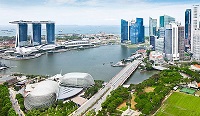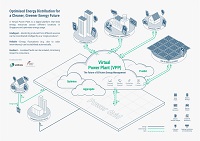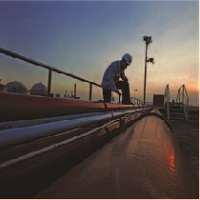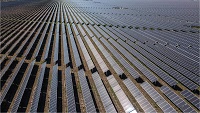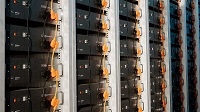Introduction
Good morning, Excellencies, Ladies and Gentlemen.
I am delighted to be here today.The energy transition is central to climate change and it is timely that we have gathered here to discuss Asia’s role in advancing the energy transition.
Asia is home to over half of the world’s population and a quarter of the world’s economy, and will be the major contributor of the world’s energy demand growth.
In the long-term, the International Energy Agency (IEA) projects that electricity consumption in the region will double by 2040. There is a pressing need to facilitate Asia’s energy transition, to sustain economic growth and to improve lives.
Asia is already responding to the demands of an increasingly carbon-constrained world
Many Asian economies have set emissions reduction targets and renewable energy goals.
For example, China has pledged to achieve carbon neutrality by 2060..
However, this energy transition will not be an easy one..
The current energy crisis unfolding around the world demonstrates that it is insufficient for countries to switch from fossil fuels to low-carbon energy sources.
Governments must transition in a calibrated way and ensure energy security and reliability..
Singapore’s Climate Efforts
Singapore is committed to playing its part in this global movement.
This morning, my colleague, Minister Gan Kim Yong, spoke about Singapore’s energy transition and outlined our plans to decarbonise electricity generation.
We will tap on renewable energy beyond our shores and collaborate with like-minded partners to explore new energy solutions such as hydrogen.
In Singapore, we believe that the energy transition is a collective regional and global effort
It is only when we work with other countries, that we will be able to achieve our collective climate goals.
Singapore has always been part of the Asian growth and sustainability story.
Today, I will share some perspectives of how Singapore intends to navigate the energy transition, and the role we hope to play in the region.
I hope that our experience may offer reference points for the region.
- With limited natural resources, Singapore must be resourceful and find creative ways to harness energy.
A key prong of our energy transition strategy is to invest in technology and innovation to address our energy challenges and sustainable development objectives.
- We have set aside resources to fund research proposals to develop and test-bed promising low-carbon energy technologies.
- Minister Gan mentioned earlier this morning that we will be increasing funding support and will be setting aside $55 million to fund research projects that are focused on improving the technical and economic feasibility of low-carbon technologies.
- To maximise the impact of our efforts, the focus of research and development is on solving problems that are specific to Singapore and the region.
- In this, we actively encourage academia and industry to come together to develop practical solution
- Keppel Infrastructure (KI) and the Nanyang Technological University (NTU) recently signed a Memorandum of Understanding to develop technological solutions on decarbonisation and circular economy, including in smart grids and digital energy solutions.
EMA and JTC Corporation (JTC) will also be launching a $6 million Request for Proposal to test bed renewable energy, energy storage systems and low carbon solutions on Jurong Island.
This will help reduce carbon emissions and bring us closer to transforming Jurong Island into a sustainable energy and chemicals park.
Successful R&D outcomes in this area will help us to deploy energy storage solutions at scale and allow us to deploy more renewable energy resources while mitigating the effects of intermittency.
Earlier, Mr Blommaert also shared ExxonMobil’s plans to create carbon storage hubs in Asia’s heavy industrial cities like Singapore.
We appreciate their efforts, and welcome ExxonMobil to work closely with stakeholders in Singapore and the region on low-carbon technologies.
The global emphasis on sustainability and the energy transition offers new economic opportunities, as industries decarbonise their operations and pivot towards more environmentally sustainability initiatives.
Bain & Company estimates that going green could bring up to US$1 trillion in annual economic benefits to Southeast Asian economies by 2030.
Singapore can contribute to Asia’s clean energy journey by serving as a base from which clean energy companies can deploy their solutions in the region.
Singapore is already a choice business and innovation location for clean energy companies.
- To provide further support for local companies’ push towards greener initiatives, Enterprise Singapore (ESG) rolled out the Enterprise Financing Scheme-Green earlier this month.
- Under this initiative, ESG will provide 70% risk-share to catalyse the lending from partner financial institutions.
- This will help to facilitate better access to green financing for Singapore companies, and support the growth of Singapore’s green economy.
The Government also plays an active role in nurturing the growth of clean energy companies.
I am happy to announce that EMA and Envision Digital have signed a Memorandum of Agreement to collaborate on programmes to grow local energy enterprises in the areas of renewable energy, urban energy efficiency and low carbon solutions.
Participating enterprises can also leverage Envision Digital’s digital platform and international customer base to expand their market reach and grow their businesses in the green economy.
I have spoken about Singapore’s domestic initiatives and how they contribute to the energy transition efforts.
However, international collaboration and cooperation is critical to ensure effective action on environmental sustainability and energy security.
Singapore has thus been playing an active role in international forums such as G20, COP26 and ASEAN summits to name a few.
A key focus of our international engagement strategy is to learn from and contribute to the international discourse on best practices and capacity building.
- With ASEAN, our focus for regional energy cooperation is to enhance connectivity and market integration.
Under the ASEAN Plan of Action for Energy Cooperation Phase II: 2021-2025, ASEAN countries have agreed to the collective and aspiration target to have one-fifth of ASEAN’s energy mix comprising of renewable energy. - ASEAN members are also working towards implementing an ASEAN Power Grid.
Singapore, together with Laos, Thailand and Malaysia have made steady progress on the Lao PDR-Thailand-Malaysia-Singapore Power Integration Project (LTMS-PIP), which will act as a pathfinder towards realising the greater vision of an ASEAN Power Grid.
The first 100MW of electrons are expected to flow in 2022 and I am hopeful, that we will have an integrated electricity market in time to come. - The shift to renewable energy solutions will need to be supported by fundamental infrastructure changes.
As Chair of the ASEAN Regional Energy Policy and Planning Sub-sector Network, Singapore will continue to facilitate more knowledge sharing and capacity building in this aspect.
- With ASEAN, our focus for regional energy cooperation is to enhance connectivity and market integration.
Singapore remains committed to play our part in the global effort to address climate change.
Situated at the crossroads of Asia and the world, Singapore stands ready to work with our regional partners to contribute towards the region’s efforts for a more sustainable energy future.
By focusing on the deployment of low carbon technologies, seizing green growth opportunities, and forging stronger collaborations between like-minded countries, the region can transition without harming growth.
- Thank you once again for being here, and I look forward to the fruitful discussions later.
